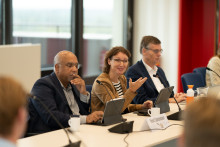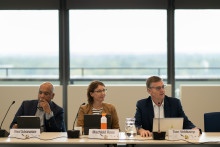The discussion was prompted by the UT’s most recent management report, which projects a 12 million euro surplus for this year. ‘Even though a 3 million euro deficit was originally forecast’, University Council member Aditya Pappu began. ‘We’re hearing from the community that this doesn’t align with the ongoing reorganisations and the strict, short-term measures still in place. It feels contradictory.’
‘We need sufficient reserves’
Vice-president Machteld Roos responded by saying that these remain ‘challenging and uncertain times’ for Dutch higher education. ‘Such uncertainty calls for a healthy and sustainable organisation. We need to maintain sufficient reserves.’
She also pointed to the specific reasons behind the reorganisations at the Faculties of S&T and ITC. ‘S&T had been running deficits for years, and ITC faced direct budget cuts from the Ministry of Foreign Affairs. In both cases, reorganisation was the only viable solution. These are different causes than those behind the UT-wide financial challenge.’
‘Responsibly relaxing measures’
President of the Executive Board Vinod Subramaniam said he understood the Council’s concerns, but stressed the ‘essential difference’ between short- and long-term finances. ‘And that 12 million euros is still a forecast – I hope we’ll reach it. The fact that we’re seeing the effects of the short-term measures is a positive sign. We do want to explore where we can responsibly relax those acute measures.’
Student assistants
Since last month, the freeze on international travel funded by the first money stream has been lifted. In addition, rector Tom Veldkamp is working with the University Committee on Education to develop new guidelines for the use of student assistants. ‘They add value, including to the quality of education. We also want to explore the role of PhD candidates in this area. But that’s still a work in progress.’
The current short-term measures – including the freeze on vacancies, temporary contracts, external hiring, and student assistants – will remain in place until at least spring 2026, the Executive Board confirmed.







